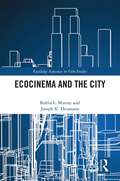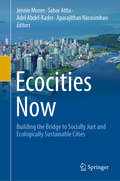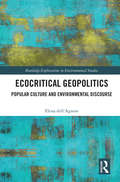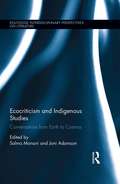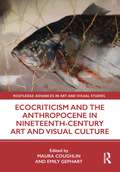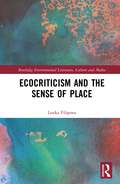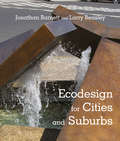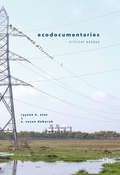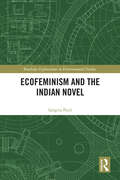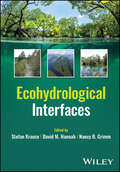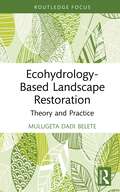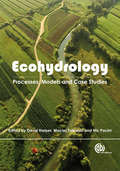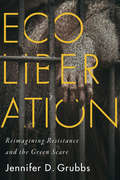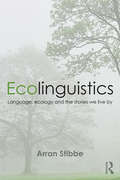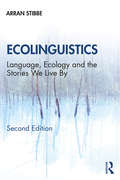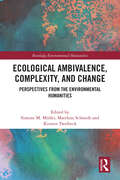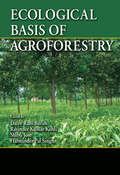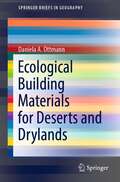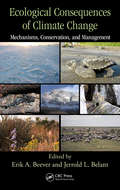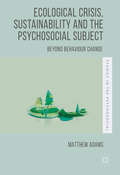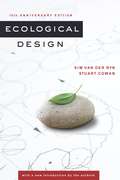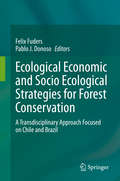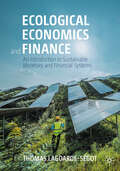- Table View
- List View
Ecocinema in the City (Routledge Advances in Film Studies)
by Robin L. Murray Joseph K. HeumannIn Ecocinema in the City, Murray and Heumann argue that urban ecocinema both reveals and critiques visions of urban environmentalism. The book emphasizes the increasingly transformative power of nature in urban settings, explored in both documentaries and fictional films such as Children Underground, White Dog, Hatari! and Lives Worth Living. The first two sections—"Evolutionary Myths Under the City" and "Urban Eco-trauma"—take more traditional ecocinema approaches and emphasize the city as a dangerous constructed space. The last two sections—"Urban Nature and Interdependence" and "The Sustainable City"—however, bring to life the vibrant relationships between human and nonhuman nature. Ecocinema in the City provides a space to explore these relationships, revealing how ecocinema shows that both human and nonhuman nature can interact sustainably and thrive.
Ecocities Now: Building the Bridge to Socially Just and Ecologically Sustainable Cities
by Sahar Attia Jennie Moore Adel Abdel-Kader Aparajithan NarasimhanThis book presents a selection of the best papers submitted to the International Ecocity World Summit held in Vancouver, October 7-11, 2019. The objective is to accelerate knowledge dissemination about the development of ecocities through attention to what constitutes an ecocity, what cities around the world are doing, what Vancouver as an emerging ecocity is doing, and how education can play a role in preparing the next generation of ecocity practitioners. The book uses the Summit’s overarching theme and sub-themes as an organizing framework and aligns with the International Ecocity Standards that serve as a diagnostic tool to help cities assess their progress on the path to becoming ecocities. The Ecocity Standards are also proving useful to communities in developing locally relevant pathways to achieving the UN Sustainable Development Goals. The book is presented in four parts that align with the Summit overarching theme of i) building a bridge to socially just and ecologically sustainable cities, supported by sub-themes of ii) climate action, iii) circular economy, and iv) informal solutions for sustainable development. Chapters comprising each part in the book are introduced by a brief precis that orients the reader to the relevant Ecocity Standards that are being addressed and other important contextual considerations that open the potential application of the chapters to an international audience. Arguments presented in the selected papers provide an orientation to the importance of engaging people, where they live, in ecocity transformations as well as emerging opportunities for affordable and accessible technologies that help cities build capacity for implementation of ecocity initiatives.
Ecocritical Geopolitics: Popular culture and environmental discourse (Routledge Explorations in Environmental Studies)
by Elena dell'AgneseWhat is the role of popular culture in shaping our discourse about the multifaceted system of material things, subjects and causal agents that we call "environment"? Ecocritical Geopolitics offers a new theoretical perspective and approach to the analysis of environmental discourse in popular culture. It combines ecocriticial and critical geopolitical approaches to explore three main themes: dystopian visions, the relationship between the human, post-human, and "nature" and speciesism and carnism. The importance of popular culture in the construction of geopolitical discourse is widely recognized. From ecocriticism, we also appreciate that literature, cinema, or theatre can offer a mirror of what the individual author wants to communicate about the relationship between the human being and what can be defined as non-human. This book provides an analysis of environmental discourses with the theoretical tools of critical geopolitics and the analytical methodology of ecocriticism. It develops and disseminates a new scientific approach, defined as "ecocritical geopolitics", to offer an idea of the power of popular culture in the realization of environmental discourse. Referencing sources as diverse as The Road, The Shape of Water, Lady and the Tramp, and TV cooking shows, this book will be of great interest to students and scholars of geography, environmental studies, film studies, and environmental humanities.
Ecocriticism and Indigenous Studies: Conversations from Earth to Cosmos (Routledge Interdisciplinary Perspectives on Literature)
by Joni Adamson Salma MonaniThis book addresses the intersections between the interdisciplinary realms of Ecocriticism and Indigenous and Native American Studies, and between academic theory and pragmatic eco-activism conducted by multiethnic and indigenous communities. It illuminates the multi-layered, polyvocal ways in which artistic expressions render ecological connections, drawing on scholars working in collaboration with Indigenous artists from all walks of life, including film, literature, performance, and other forms of multimedia to expand existing conversations. Both local and global in its focus, the volume includes essays from multiethnic and Indigenous communities across the world, visiting topics such as Navajo opera, Sami film production history, south Indian tribal documentary, Maori art installations, Native American and First Nations science-fiction literature and film, Amazonian poetry, and many others. Highlighting trans-Indigenous sensibilities that speak to worldwide crises of environmental politics and action against marginalization, the collection alerts readers to movements of community resilience and resistance, cosmological thinking about inter- and intra-generational multi-species relations, and understandings of indigenous aesthetics and material ecologies. It engages with emerging environmental concepts such as multispecies ethnography, cosmopolitics, and trans-indigeneity, as well as with new areas of ecocritical research such as material ecocriticism, biosemiotics, and media studies. In its breadth and scope, this book promises new directions for ecocritical thought and environmental humanities practice, providing thought-provoking insight into what it means to be human in a locally situated, globally networked, and cosmologically complex world.
Ecocriticism and the Anthropocene in Nineteenth-Century Art and Visual Culture (Routledge Advances in Art and Visual Studies)
by Maura CoughlinIn this volume, emerging and established scholars bring ethical and political concerns for the environment, nonhuman animals and social justice to the study of nineteenth-century visual culture. They draw their theoretical inspiration from the vitality of emerging critical discourses, such as new materialism, ecofeminism, critical animal studies, food studies, object-oriented ontology and affect theory. This timely volume looks back at the early decades of the Anthropocene to query the agency of visual culture to critique, create and maintain more resilient and biologically diverse local and global ecologies.
Ecocriticism and the Sense of Place (Routledge Environmental Literature, Culture and Media)
by Lenka FilipovaThe book is an investigation into the ways in which ideas of place are negotiated, contested and refigured in environmental writing at the turn of the twenty-first century. It focuses on the notion of place as a way of interrogating the socio-political and environmental pressures that have been seen as negatively affecting our environments since the advent of modernity, as well as the solutions that have been given as an antidote to those pressures. Examining a selection of literary representations of place from across the globe, the book illuminates the multilayered and polyvocal ways in which literary works render local and global ecological relations of places. In this way, it problematises more traditional environmentalism and its somewhat essentialised idea of place by intersecting the largely Western discourse of environmental studies with postcolonial and Indigenous studies, thus considering the ways in which forms of emplacement can occur within displacement and dispossession, especially within societies that are dealing with the legacies of colonialism, neocolonial exploitation or international pressure to conform. As such, the work foregrounds the singular processes in which different local/global communities recognise themselves in their diverse approaches to the environment, and gestures towards an environmental politics that is based on an epistemology of contact, connection and difference, and as one, moreover, that recognises its own epistemological limits. This book will appeal to researchers working in the fields of environmental humanities, postcolonial studies, Indigenous studies and comparative literature.
Ecodesign for Cities and Suburbs
by Jonathan Barnett Larry BeasleyAs world population grows, and more people move to cities and suburbs, they place greater stress on the operating system of our whole planet. But urbanization and increasing densities also present our best opportunity for improving sustainability, by transforming urban development into desirable, lower-carbon, compact and walkable communities and business centers. Jonathan Barnett and Larry Beasley seek to demonstrate that a sustainable built and natural environment can be achieved through ecodesign, which integrates the practice of planning and urban design with environmental conservation, through normal business practices and the kinds of capital programs and regulations already in use in most communities. Ecodesign helps adapt the design of our built environment to both a changing climate and a rapidly growing world, creating more desirable places in the process. In six comprehensively illustrated chapters, the authors explain ecodesign concepts, including the importance of preserving and restoring natural systems while also adapting to climate change; minimizing congestion on highways and at airports by making development more compact, and by making it easier to walk, cycle and take trains and mass transit; crafting and managing regulations to insure better placemaking and fulfill consumer preferences, while incentivizing preferred practices; creating an inviting and environmentally responsible public realm from parks to streets to forgotten spaces; and finally how to implement these ecodesign concepts. Throughout the book, the ecodesign framework is demonstrated by innovative practices that are already underway or have been accomplished in many cities and suburbs--from Hammarby Sjöstad in Stockholm to False Creek North in Vancouver to Battery Park City in Manhattan, as well as many smaller-scale examples that can be adopted in any community. Ecodesign thinking is relevant to anyone who has a part in shaping or influencing the future of cities and suburbs - designers, public officials, and politicians.
Ecodocumentaries
by Rayson K. Alex S. Susan DeborahThis book features ten critical essays on ecodocumentaries written by eminent scholars from India, USA, Ireland, Finland and Turkey in the area of ecocinema studies. Situating social documentaries with explicit ecological form and content, the volume takes relational positions on political, cultural and conservational aspects of natures and cultures in various cultural contexts. Documentaries themed around issues such as electronic waste, animal rights, land ethics, pollution of river, land grabbing, development and exotic plants are some of the topics ecocritiqued in this volume.
Ecofeminism and the Indian Novel (Routledge Explorations in Environmental Studies)
by Sangita PatilEcofeminism and the Indian Novel tests the theories of ecofeminism against the background of India’s often different perceptions of environmental problems, challenging the hegemony of Western culture in thinking about human problems. This book moves beyond a simple application of the concepts of ecofeminism, instead explaining the uniqueness of Indian novels as narratives of ecofeminism and how they can contribute to the development of the theory of ecofeminism. In examining a selection of novels, the author argues that Indian texts conceptualize the ecological crisis more as a human problem than as a gender problem. The book proposes that we should think of ecofeminism as ecohumanism instead, seeing human beings and nature as a part of a complex web. Novels analysed within the text include Kamala Markandaya’s Nectar in a Sieve (1954), Shivram Karanth’s Return to Earth (2002) and Na D’Souza’s Dweepa (2013). Ecofeminism and the Indian Novel will be of great interest to students and scholars of ecofeminism, ecocriticism, ecological feminism, environmental humanities, gender studies, ecological humanities, feminist studies and Indian literature.
Ecogames: Playful Perspectives on the Climate Crisis (Green Media)
by Stefan Werning Gerald Farca Joost Raessens Beke, Laura op deWith the climate crisis and its repercussions becoming more and more tangible, games are increasingly participating in the production, circulation, and interrogation of environmental assumptions, using both explicit and implicit ways of framing the crisis. Whether they are providing new spaces to imagine and practice alternative forms of living, or reproducing ecomodernist fantasies, games as well as player cultures are increasingly tuned in to the most pressing environmental concerns. This book brings together chapters by a diverse group of established and emerging authors to develop a growing body of scholarship that explores the shape, impact, and cultural context of ecogames. The book comprises four thematic sections, Today's Challenges: Games for Change, Future Worlds: New Imaginaries, The Nonhuman Turn, and Critical Metagaming Practices. Each section explores different aspects of ecocritical engagement in and through games. As a result, the book's comprehensive scope covers a variety of angles, methodologies, and case studies, significantly expanding the field of green media studies.
Ecohydrological Interfaces
by Stefan Krause David M. Hannah Nancy B. GrimmEcohydrological Interfaces Comprehensive overview of the process dynamics and interactions governing ecohydrological interfaces Summarizing the interdisciplinary investigation of ecohydrological interface functioning, Ecohydrological Interfaces advances the understanding of their dynamics across traditional subject boundaries. It offers a detailed explanation of the underlying mechanisms and process interactions governing ecohydrological interface functioning from the micro scale to the ecosystem and regional scale. The multidisciplinary team of authors integrates and synthesises the current understanding of process dynamics at different ecohydrological interfaces to develop a unifying concept of their ecosystem functions. The work introduces novel experimental and model-based methods for characterizing and quantifying ecohydrological interface processes, taking account of innovative sensing and tracing technologies as well as microbial and molecular biology approaches. Key questions addressed in the book include: Which conditions stimulate the transformative nature of ecohydrological interfaces? How are ecohydrological interfaces organized in space and time? How does interface activity propagate from small to large scales? How do ecohydrological interfaces react to environmental change and what is their role in processes of significant societal value? As a research level text on the functionality and performance of ecohydrological interfaces, Ecohydrological Interfaces is primarily aimed at academics and postgraduate researchers. It is also appropriate for university libraries as further reading on a range of geographical, environmental, biological, and engineering topics.
Ecohydrology-Based Landscape Restoration: Theory and Practice (Routledge Focus on Environment and Sustainability)
by Mulugeta Dadi BeleteThis book provides an introduction to a fairly new approach to natural resources management practice entitled ecohydrology-based landscape restoration. Ecohydrology-based landscape restoration integrates landscape restoration practices with ecohydrology science and principles in order to help address the limitations of current management practices in developing countries. Focusing on both the theory and practice of implementing new management practices, the book includes conceptual designs and practical demonstrations for a variety of sites, including hillsides, farmlands, gullies, riparian buffers and wetlands, while also drawing on field research conducted in Ethiopia. The book puts forward principles for improving current practices, which include the better integration of hydrological and ecological concerns, the greater involvement of local communities, the adoption of indigenous practices, the establishment of green and semi-grey infrastructure as an ecohydrological systemic solution and the necessity of taking an adaptive approach to managing landscapes. This book will be of great interest to students and scholars of water resource management, ecohydrology and landscape restoration as well as professionals involved in the restoration of landscapes in developing countries.
Ecohydrology: An Approach to the Sustainable Management of Water Resources
by Maciej Zalewski Nic Pacini David HarperEcohydrology is an emerging new sub-discipline which links elements of ecology with hydrology at all points in the water cycle, ranging in scale from water-plant physiological relationships to whole catchment water-ecosystem processes. This book pays most attention to the larger scales of ecohydrology, emphasizing the use of this tool in striving towards the goal of sustainable water management. Authors from Eastern and Western Europe, America, Australia and South Africa give a broad global context.
Ecoliberation: Reimagining Resistance and the Green Scare (Outspoken)
by Jennifer D. GrubbsDisenchanted by indirect forms of protest designed to work within existing systems of corporate and state power, animal and earth liberation activists have turned instead to direct action. In this detailed ethnographic account Jennifer Grubbs takes the reader inside the complicated, intricate world of these powerful and controversial interventions, nuancing the harrowing realities of political repression with the inspiring, clever ways that activists resist.Grubbs draws on her personal experiences within the movement to offer a thoughtful and intersectional analysis. Tracing the strategies of liberationist activists as they grapple with doing activism under extreme repression, Ecoliberation challenges ubiquitous frameworks that position protestors as either good or bad by showing how activists playfully and confrontationally enact radical social change. Nearly a decade in the making, the book looks back at the notorious period of repression called the Green Scare and draws contemporary connections to the creep of fascism under President Donald Trump.In stories that are simultaneously heartbreaking, riddled with tension and contradiction, and inspiring, Grubbs proves that whether or not the revolution is televised, it will be spectacular.
Ecolinguistics: Language, Ecology and the Stories We Live By
by Arran StibbeThe increasingly rapid destruction of the ecological systems that support life is calling into question some of the fundamental stories that we live by: stories of unlimited economic growth, of consumerism, progress, individualism, success, and the human domination of nature. Ecolinguistics shows how linguistic analysis can help reveal the stories we live by, open them up to question, and contribute to the search for new stories. Bringing together the latest ecolinguistic studies with new theoretical insights and practical analyses, this book charts a new course for ecolinguistics as an engaged form of critical enquiry. Featuring: A framework for understanding the theory of ecolinguistics and applying it practically in real life; Exploration of diverse topics from consumerism in lifestyle magazines to Japanese nature haiku; A comprehensive glossary giving concise descriptions of the linguistic terms used in the book; Discourse analysis of a wide range of texts including newspapers, magazines, advertisements, films, nonfiction books, and visual images. This is essential reading for undergraduates, postgraduates and researchers working in the areas of Discourse Analysis and Language and Ecology.
Ecolinguistics: Language, Ecology and the Stories We Live By (Bloomsbury Advances In Ecolinguistics Ser.)
by Arran StibbeEcolinguistics: Language, Ecology and the Stories We Live By is a ground-breaking book which reveals the stories that underpin unequal and unsustainable societies and searches for inspirational forms of language that can help rebuild a kinder, more ecological world. This new edition has been updated and expanded to bring together the latest ecolinguistic studies with new theoretical insights and practical analyses. The book presents a theoretical framework and practical tools for analysing the key texts which shape the society we live in. The theory is illustrated through examples, including the representation of environmental refugees in the media; the construction of the selfish consumer in economics textbooks; the parallels between climate change denial and coronavirus denial; the erasure of nature in the Sustainable Development Goals; creation myths and how they orient people towards the natural world; and inspirational forms of language in nature writing, Japanese haiku and Native American writing. This edition provides an updated theoretical framework, new example analyses, and an additional chapter on narratives. Accompanied by a free online course with videos, PowerPoints, notes and exercises (www.storiesweliveby.org.uk), as well as a comprehensive glossary, this is essential reading for undergraduates, postgraduates and researchers working in the areas of Discourse Analysis, Environmental Studies and Communication Studies.
Ecological Ambivalence, Complexity, and Change: Perspectives from the Environmental Humanities (Routledge Environmental Humanities)
by Müller, Edited by Simone M.This book provides a systematic, interdisciplinary analysis of the conflicts, issues, and tensions associated with today’s ecological transformation processes from an Environmental Humanities perspective. It explores the notion of ecological ambivalence, where conflicting reactions, beliefs, or feelings toward public policies or private practices for "saving planet Earth" threaten to produce a stalemate.Under the umbrella of the Environmental Humanities, the book brings together scholars from fields such as environmental history, ecological economics, human geography, and ecocriticism. Contributions investigate the dissonances, or ambivalences, wound up with processes of environmental transformation both conceptually and empirically. Case studies range from wind farms in India to green mineral mines in Mexico, and from chemical contamination in Denmark to Rocky Mountain Arsenal in Denver, USA. Additionally, with a focus on creative environmental communication—as in Philippe Squarzoni’s graphic novel Climate Changed or G’Ebinyo Ogbowei’s poetry—contributions also present possible pathways for overcoming ambivalences, managing them creatively, or critiquing the concept as whole. The volume highlights how the humanities, the arts, and the social sciences can work together to help humankind develop and cultivate the skills to overcome paralysis and engage in practical action, and in doing so, puts forth ambivalence as an approach for being in today’s world.This book will be of interest to researchers, academics, and students from the Environmental Humanities, the social sciences, the humanities, and the environmental sciences. It will also be useful for decisionmakers, think tanks, NGOs, and activists.
Ecological Basis of Agroforestry
by Shibu Jose Ravinder Kumar Kohli Harminder Pal Singh Daizy Rani BatishFaced with the growing problems of climate change, ecosystem degradation, declining agricultural productivity, and uncertain food security, modern agricultural scientists look for potential relief in an ancient practice. Agroforestry, if properly designed, can mitigate greenhouse effects, maintain ecosystem health and biodiversity, provide food sec
Ecological Building Materials for Deserts and Drylands (SpringerBriefs in Geography)
by Daniela A. OttmannThis book examines prospective climate adaptive building materials in desert and drylands in the context of climate change, desertification, urbanisation demands, and the consequent sustainable urban development challenges. This preliminary collection of ecological materials covers the characterisation of biotic and abiotic resources for materials, their specifications and benefits for adequate bio-climatic design and construction. Particular emphasis is given to ecological composite materials for advances in desert architecture. Based on the initial collection, the book culminates with potentials for new ecological building materials. The "eComposite Combinator" matrix offers potential research recipes and encourages the reader to conduct further climate-matters related research.
Ecological Climatology
by Gordon BonanThe third edition of Gordon Bonan's comprehensive textbook introduces an interdisciplinary framework to understand the interaction between terrestrial ecosystems and climate change. Ideal for advanced undergraduate and graduate students studying ecology, environmental science, atmospheric science, and geography, it reviews basic meteorological, hydrological, and ecological concepts to examine the physical, chemical, and biological processes by which terrestrial ecosystems affect and are affected by climate. This new edition has been thoroughly updated with new science and references. The scope has been expanded beyond its initial focus on energy, water, and carbon to include reactive gases and aerosols in the atmosphere. The new edition emphasizes the Earth as a system, recognizing interconnections among the planet's physical, chemical, biological, and socioeconomic components, and emphasizing global environmental sustainability. Each chapter contains chapter summaries and review questions, and with over 400 illustrations, including many in color, this textbook will once again be an essential student guide.
Ecological Consequences of Climate Change: Mechanisms, Conservation, and Management
by Jerome Klosowski Jerrold L. BelantContemporary climate change is a crucial management challenge for wildlife scientists, conservation biologists, and ecologists of the 21st century. Climate fingerprints are being detected and documented in the responses of hundreds of wildlife species and numerous ecosystems around the world. To mitigate and accommodate the influences of climate ch
Ecological Crisis, Sustainability and the Psychosocial Subject
by Matthew AdamsThis book draws on recent developments across a range of perspectives including psychoanalysis, narrative studies, social practice theory, posthumanism and trans-species psychology, to establish a radical psychosocial alternative to mainstream understanding of 'environmental problems'. Only by addressing the psychological and social structures maintaining unsustainable societies might we glimpse the possibility of genuinely sustainable future. The challenges posed by the reality of human-caused 'environmental problems' are unprecedented. Understanding how we respond to knowledge of these problems is vital if we are to have a hope of meeting this challenge. Psychology and the social sciences have been drafted in to further this understanding, and inform interventions encouraging sustainable behaviour. However, to date, much of psychology has appeared happy to tinker with individual behaviour change, or encourage minor modifications in the social environment aimed at 'nudging' individual behaviour. As the ecological crisis deepens, it is increasingly recognised that mainstream understandings and interventions are inadequate to the collective threat posed by climate change and related ecological crises.
Ecological Design, Tenth Anniversary Edition: An Ecological Design Retrospective
by Sim Van der Ryn Stuart CowanEcological Design is a landmark volume that helped usher in an exciting new era in green design and sustainability planning. Since its initial publication in 1996, the book has been critically important in sparking dialogue and triggering collaboration across spatial scales and design professions in pursuit of buildings, products, and landscapes with radically decreased environmental impacts. This 10th anniversary edition makes the work available to a new generation of practitioners and thinkers concerned with moving our society onto a more sustainable path. Using examples from architecture, industrial ecology, sustainable agriculture, ecological wastewater treatment, and many other fields, Ecological Design provides a framework for integrating human design with living systems. Drawing on complex systems, ecology, and early examples of green building and design, the book challenges us to go further, creating buildings, infrastructures, and landscapes that are truly restorative rather than merely diminishing the rate at which things are getting worse.
Ecological Economic and Socio Ecological Strategies for Forest Conservation: A Transdisciplinary Approach Focused on Chile and Brazil
by Felix Fuders Pablo J. DonosoThis book proposes strategies for improving the resilience and conservation of temperate forests in South America, such that these forests can provide ecosystem services in a sustainable way. As such it contributes to the design of a resilient human-forest model that takes into account the multiculturalism of local communities, in many cases including aspects of ecological economics, development economics and territorial development planning that are related to indigenous peoples or first nations. Further, it provides proposals for public and territorial policies that improve the state of conservation of native forests and forest ecosystems, based on a critical analysis of the economic factors that lead to the degradation of forest ecosystems in South America today. This edition was conceived by members of the Transdisciplinary Research Center for Social and Ecological Strategies for Sustainable Forest Management in South America at the Universidad Austral de Chile. It includes contributions by distinguished researchers from around the world, combining the fields of economics, ecology, biology, anthropology, sociology and statistics. It is not, however, simply a collection of works written by authors from different disciplines, but rather each chapter is in itself transdisciplinary. This approach makes the book a unique contribution to enhancing social, managerial and political approaches to forestry management, helping to protect forest ecosystem services and make them more sustainable. This, in turn, will benefit local communities and society as a whole, by reducing the negative externalities of forestry management and enhancing future opportunities.
Ecological Economics and Finance: An Introduction to Sustainable Monetary and Financial Systems
by Thomas Lagoarde-SégotThis textbook, written by fifteen economists from the SDSN France network, provides an accessible introduction to ecological economics and finance. It examines the development of monetary and financial systems to demonstrate how they limit sustainability and hinder environmental goals. By offering a pluralist perspective, with ideas from both macro and microeconomics, the chapters offer a framework for a new kind of economics that is built around sustainability. Empirical case studies are utilized to give insight into the failure of traditional financial systems and to highlight the actions required to meet the 2030 Sustainable Development Agenda. Introductory boxes, learning objectives, real-world examples, and revision questions are included to aid learning and self-assessment. This textbook, based on the book Ecological Money and Finance (2023), shows how economics can combat ecological challenges and have a positive impact on efforts to tackle climate change. It will be relevant to students interested in environmental economics and sustainable finance.
